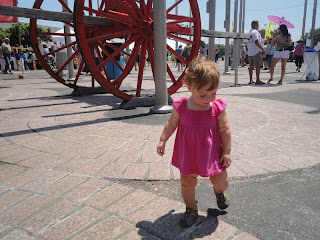 |
| Image credit: www.lilomaternity.com |
A few weeks ago, I published this post on some of the research on early toileting. Truthfully, I wasn't overly happy with the post, mainly due to a mix of lack of time and lack of research that focused on age and toileting. So, I decided that I would dedicate another Science Friday post to the topic and hopefully share a bit more of the limited information about age and also look at the research that explores the various methods of toileting.
A quick google search of "potty training" will lead many parents to believe that young babies and toddlers are not capable of bowel or bladder control. Babycenter.com actually tells us "Before 12 months of age, children can't control their bladder or bowel movements..." However, one study comparing bladder function in babies in Vietnam (where the babies rarely wore diapers) and Sweden (where all of the babies wore diapers) reveals that this isn't the case. How do you test for bladder control? The researchers measured voided urine for newborn babies to those 12-months old and then used an ultrasound to determine the amount of "residual urine." This reminded me of my first ultrasound when the technician told me that I needed to pee before I actual knew that I needed to. Additionally, researchers looked for "interrupted voiding," the phenomenon of two urination episodes within 10 minutes of each other, with higher residual urine after the first urination. Interrupted voiding may be caused by immature muscle control and tends to decrease with age and is typically stops when the child is potty-trained.
The researchers discovered that the babies in Vietnam exhibited much more advanced bladder control than the babies in Sweden. Instances of interrupted voiding stopped at 9 months for the Vietnamese babies, but continued until 27 months for some of the Swedish children. Additionally, instances of "incomplete emptying" which is measured by the residual urine ended between 9 and 12 months for the Vietnamese children (residual urine was just .7ml and .5ml, in case you are really interested). For the Swedish children, residual urine instances were still very high at 9 to 12 months (averages were 7.4 ml to 7.1 ml). Most Swedish children obtained complete bladder emptying at around 2 years old. Using these data, the researchers conclude that the Vietnamese babies do exhibit bladder and bowel muscle control before 12 months and "can be considered potty trained much earlier than children in Western countries."
Looking beyond when to potty train, the next question most caregivers ask themselves is, "how should I do this?" Again, the research that has been conducted is not overly helpful. While there has been substantially more research that examines potty training methods than examine the the best age for potty readiness, the research often does not compare the various methods, and instead focuses on the results of one method. However, within research circles, there are typically four accepted methods of toileting (these descriptions are meant to be very brief! Please do more research before following one!):
- Child-oriented: Typically starting around 18 months, the child is introduced to the potty according to her timeline. Diaperless time is used as the child demonstrates they are comfortable sitting on the potty. No system of rewards or punishments are used.
- Azrin-Foxx Method: Typically begins around 20 months of age. Child and caregiver stay in a room with all necessary supplies and with minimal distractions (i.e. toys). A doll that wets itself is used to demonstrate the potty method. Child is given praise (snacks, verbal praise) for using the potty and reinforcements are removed when the child has an accident. After an accident, the caregiver also uses the doll to demonstrate 10 "positive practice" sessions.
- Early elimination: Starts within the first weeks of life or at less than 4-5 months. Caregivers learn to read infants elimination cues and allow child to void in an appropriate place, providing feedback to the baby. Through work with the caregiver, the child is expected to learn to communicate her need to use the toilet. By the time the child can walk, she is expected take herself to the toilet.
- Dr. Spock's Method: Typically around 2-2.5 years. Allows the child to choose to potty train when they are ready. Introduce potty chair and keep it insight. Suggest to child she use it to eliminate. When child shows interest, start to ask them to use the potty throughout the day.
- No studies analyzing the results of elimination communication or early elimination.
- No "head-to-head comparasion" of the child-oriented method and the Azrin-Foxx method, making it impossible to truly compare the results.
- But, looking at the results of individual studies, the Azrin-Foxx method typically has faster outcomes when followed precisely, sometimes within days.
- For longer-term success (1 to 4 months of training) both Azrin-Foxx and child-led methods are successful for healthy children.
What method of potty training did you use, or do you plan to use? What is your reasoning?
Sources:
Duong, T.H., Jansson, U., Holmdahl, G., Sille, U., & Hellstrom, A. (2010). Development of bladder control in the first year of life in children who are potty trained early. Journal of Pediatric Urology, 6, 501e505
Kiddoo D, Klassen TP, Lang ME, Friesen C, Russell K, Spooner C, Vandermeer B. The Effectiveness of Different Methods of Toilet Training for Bowel and Bladder Control. EvidenceReport/Technology Assessment No. 147. (Prepared by the University of Alberta Evidence-based Practice Center, under contract number 290-02-0023). AHRQ Publication No. 07-E003 Rockville, MD: Agency for Healthcare Research and Quality. December 2006. Retrieved from http://www.ahrq.gov/downloads/pub/evidence/pdf/toilettraining/toilettr.pdf



























